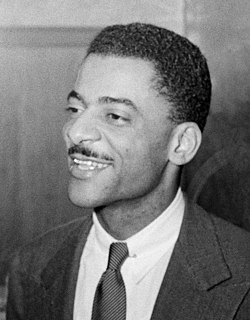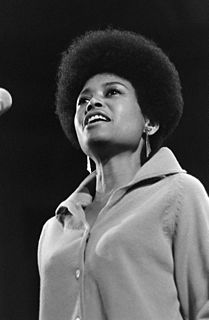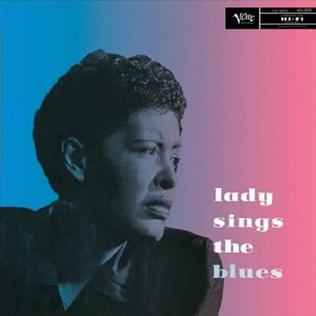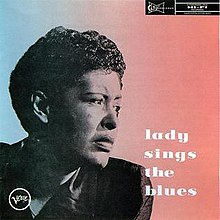
Billie Holiday was an American jazz and swing music singer. Nicknamed "Lady Day" by her friend and music partner, Lester Young, Holiday had an innovative influence on jazz music and pop singing. Her vocal style, strongly inspired by jazz instrumentalists, pioneered a new way of manipulating phrasing and tempo. She was known for her vocal delivery and improvisational skills.

Lady Sings the Blues is a 1972 American biographical drama film directed by Sidney J. Furie about jazz singer Billie Holiday, loosely based on her 1956 autobiography which, in turn, took its title from Holiday's songs. It was produced by Motown Productions for Paramount Pictures. Diana Ross, in her feature film debut, portrayed Holiday, alongside a cast including Billy Dee Williams, Richard Pryor, James T. Callahan and Scatman Crothers. The film was nominated for five Academy Awards in 1973, including Best Actress in a Leading Role for Diana Ross.

Harry "Sweets" Edison was an American jazz trumpeter and a member of the Count Basie Orchestra. His most important contribution was as a Hollywood studio musician, whose muted trumpet can be heard backing singers, most notably Frank Sinatra.

Barney Kessel was an American jazz guitarist born in Muskogee, Oklahoma. Known in particular for his knowledge of chords and inversions and chord-based melodies, he was a member of many prominent jazz groups as well as a "first call" guitarist for studio, film, and television recording sessions. Kessel was a member of the group of session musicians informally known as the Wrecking Crew.

Theodore Shaw Wilson was an American jazz pianist. Described by critic Scott Yanow as "the definitive swing pianist", Wilson had a sophisticated, elegant style. His work was featured on the records of many of the biggest names in jazz, including Louis Armstrong, Lena Horne, Benny Goodman, Billie Holiday, and Ella Fitzgerald. With Goodman, he was one of the first black musicians to appear prominently with white musicians. In addition to his extensive work as a sideman, Wilson also led his own groups and recording sessions from the late 1920s to the 1980s.

Charles James Shavers was an American jazz trumpeter who played with Dizzy Gillespie, Nat King Cole, Roy Eldridge, Johnny Dodds, Jimmie Noone, Sidney Bechet, Midge Williams, Tommy Dorsey, and Billie Holiday. He was also an arranger and composer, and one of his compositions, "Undecided", is a jazz standard.

Anna Marie Wooldridge, known professionally as Abbey Lincoln, was an American jazz vocalist, songwriter, and actress. She was a civil rights activist beginning in the 1960s. Lincoln made a career out of delivering deeply felt presentations of standards as well as writing and singing her own material.

James George Hunter, known professionally as Jimmy Rowles, was an American jazz pianist, vocalist, and composer. As a bandleader and accompanist, he explored multiple styles including swing and cool jazz.

Carmen Mercedes McRae was an American jazz singer. She is considered one of the most influential jazz vocalists of the 20th century and is remembered for her behind-the-beat phrasing and ironic interpretation of lyrics.
"God Bless the Child" is a song written by Billie Holiday and Arthur Herzog Jr. in 1939. It was first recorded on May 9, 1941, by Billie Holiday and released by the Okeh Records in 1942.
"East of the Sun " is a popular song written by Brooks Bowman, an undergraduate member of Princeton University's Class of 1936, for the 1934 production of the Princeton Triangle Club's production of Stags at Bay. It was published in 1934 by Santly Bros. and soon became a hallmark of the Princeton Tigertones, one of Princeton University's all-male a cappella groups. The standard is also sung by the Princeton Nassoons, Princeton University's oldest a cappella group.
"Sophisticated Lady" is a jazz standard, composed as an instrumental in 1932 by Duke Ellington.
"Good Morning Heartache" is a song written by Irene Higginbotham, Ervin Drake, and Dan Fisher. It was recorded by jazz singer Billie Holiday on January 22, 1946.
"What a Little Moonlight Can Do" is a popular song written by Harry M. Woods in 1934. In 1934, Woods moved to London for three years where he worked for the British film studio Gaumont British, contributing material to several films, one of which was Road House (1934). The song was sung in the film by Violet Lorraine and included an introductory verse, not heard in the version later recorded by Billie Holiday in 1935.
"Them There Eyes" is a jazz song written by Maceo Pinkard, Doris Tauber, and William Tracey that was published in 1930. One of the early recorded versions was performed by Louis Armstrong in 1931. It was made famous by Billie Holiday, who recorded her version in 1939 for Vocalion Records. A version by Emile Ford & The Checkmates reached number 18 on the UK Singles Chart in 1960.
"Don't Explain" is a song written by jazz singer Billie Holiday and Arthur Herzog Jr.

Joseph Barry Galbraith was an American jazz guitarist.

Lady Sings the Blues is an album by American jazz vocalist Billie Holiday released in December 1956. It was Holiday's last album released on Clef Records; the following year, the label would be absorbed by Verve Records. Lady Sings the Blues was taken from sessions taped during 1954 and 1956. It was released simultaneously with her ghostwritten autobiography of the same name.

The discography of Billie Holiday, an American jazz singer, consists of 12 studio albums, three live albums, 24 compilations, six box sets, and 38 singles.












